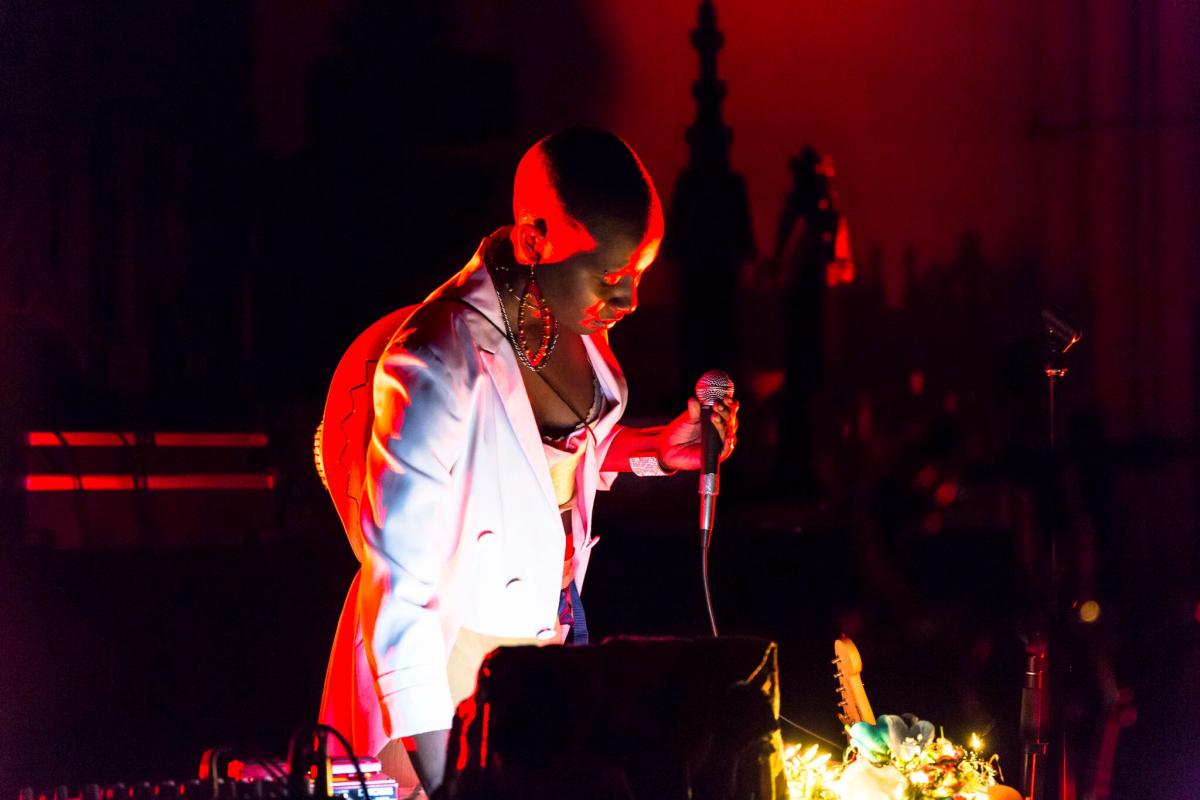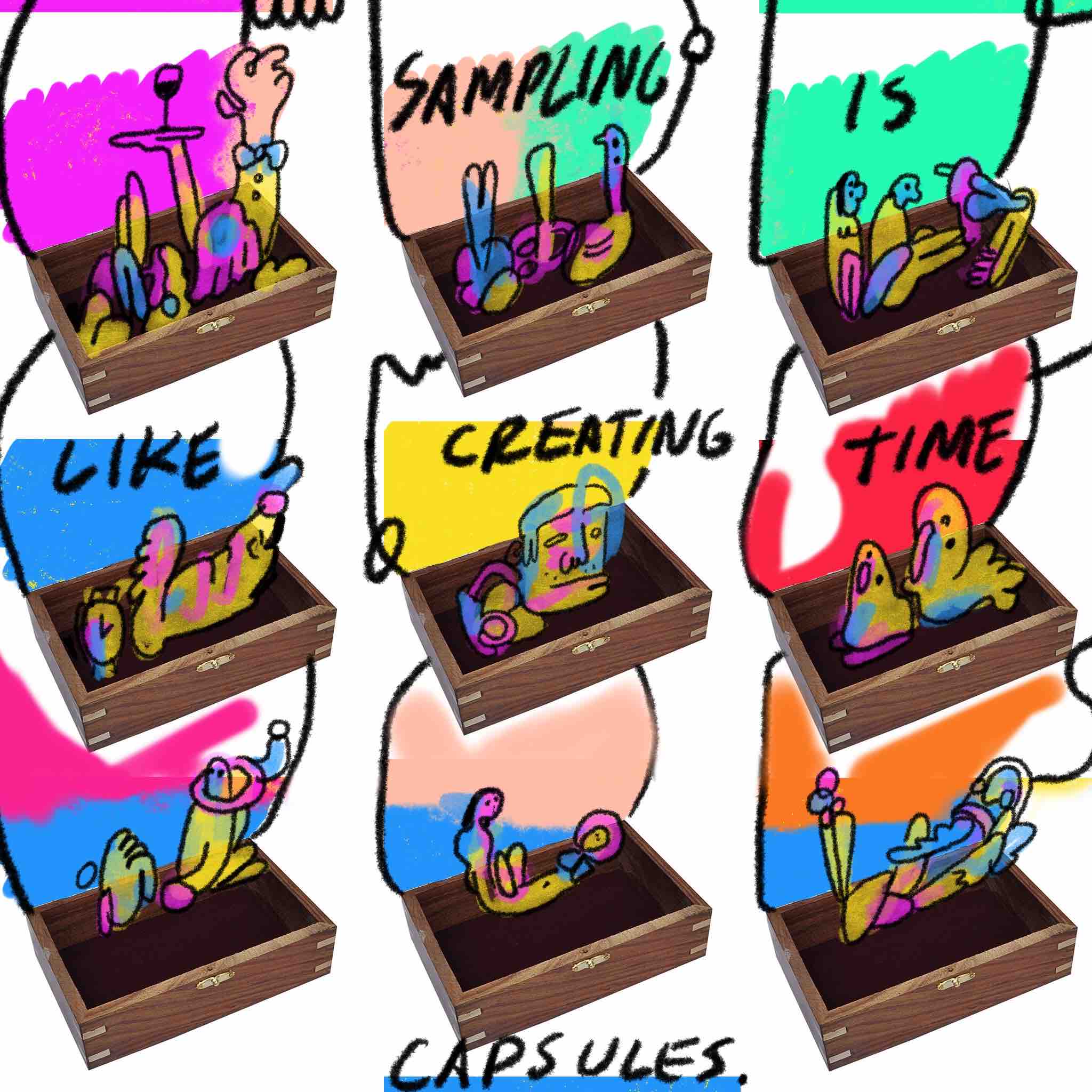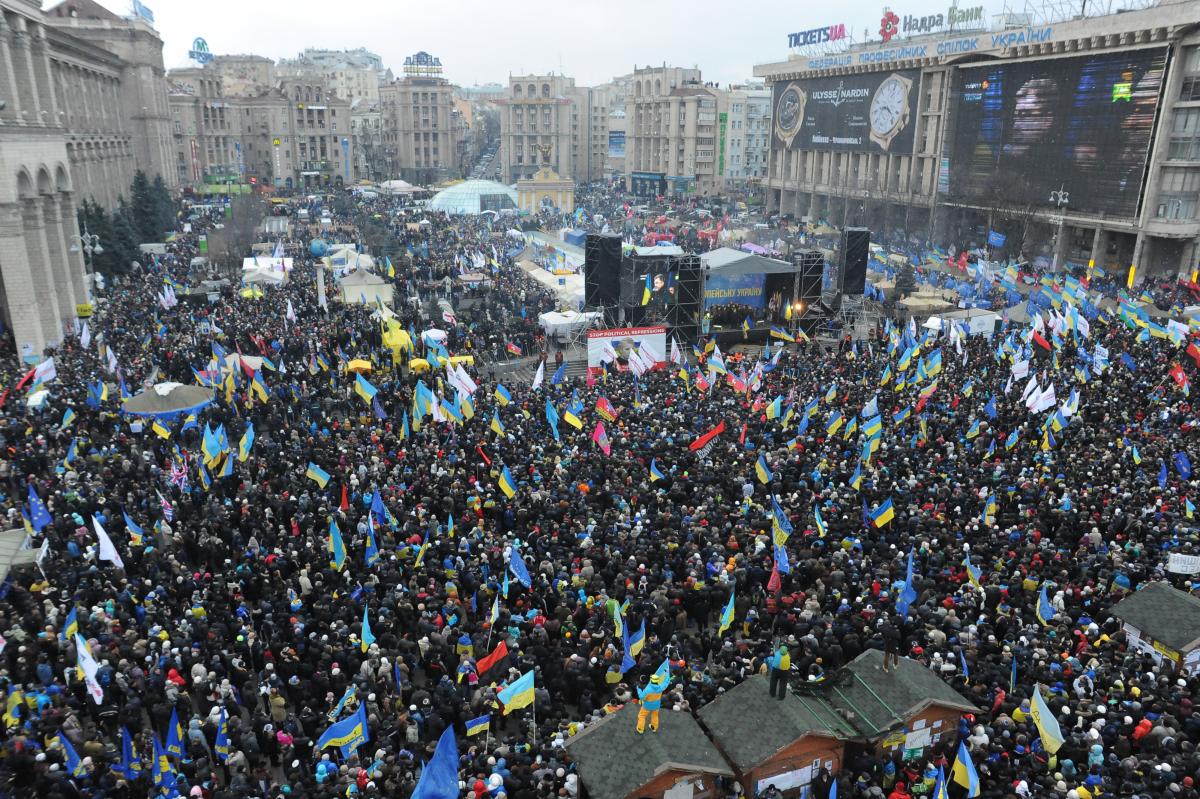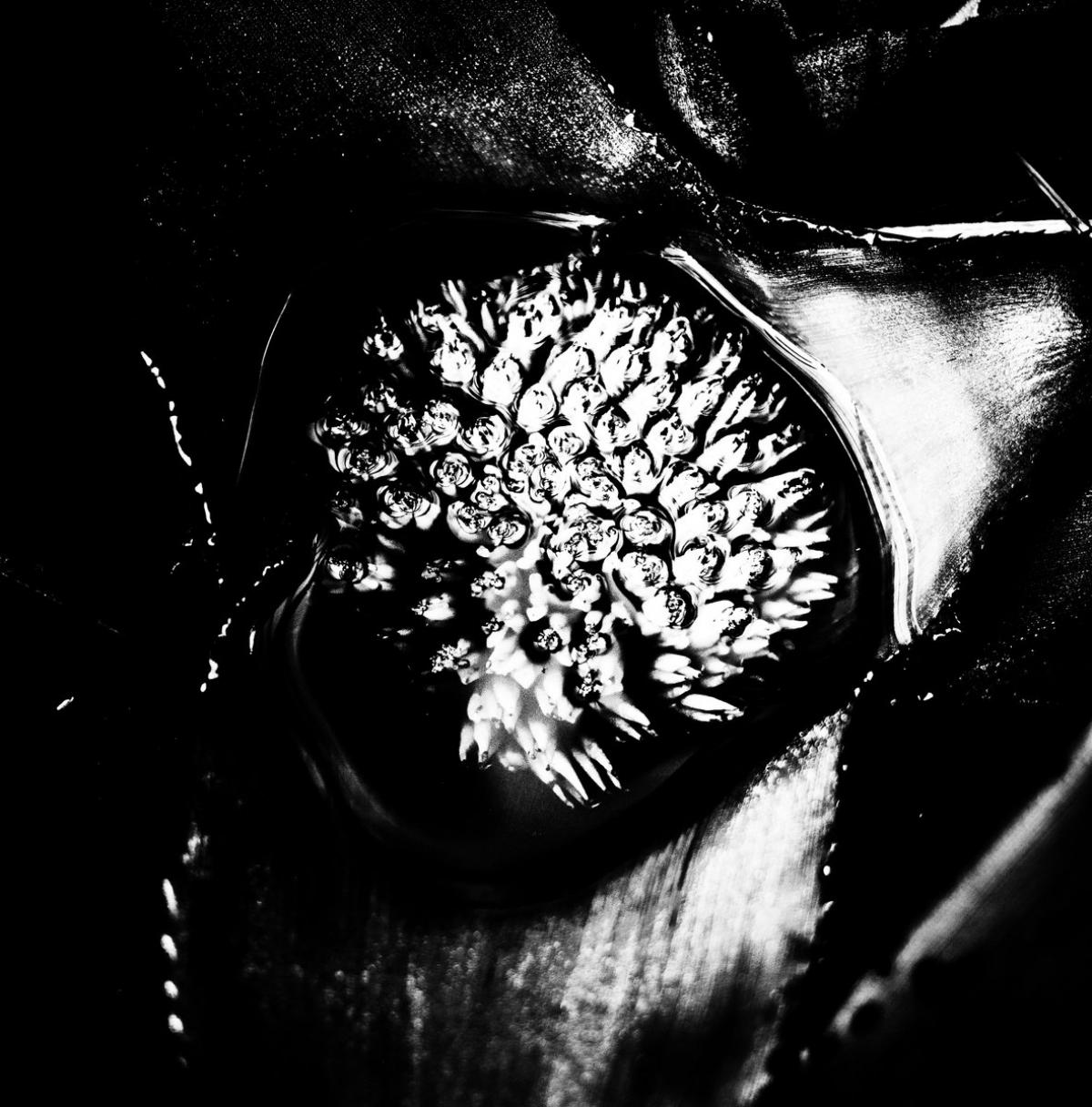Nearly thirty years on, sampling remains central to the tracks of English producer Aniruddha Das. Although he takes most of his samples of Indian and Arabic percussion from two CDs, his creative strategies in processing them are almost limitless and ever developing. As a part of Asian Dub Foundation and more recently also with his personal project Dr. Das he understands sampling as a political, yet militant instrument. In the interview he gives insight into his sampling practice and talks about musical exoticism, political meaning, and the use of distortion within his tracks, self-labelled as «dubnoiz». This interview is an exploration in eight chapters, each of them introduced by one track of Dr. Das' album Caustic (self-released 2017).
Unfortunately the tracks are no longer accessible online.
I General Approach
«A sample is not a replacement for a live musician, but an opportunity, through manipulation, to create a new sound.»
[Hannes Liechti]: How do you understand sampling?
[Aniruddha Das]: On a technical level sampling is a means of making a digital copy of a pre-recorded or live sound which then enables that sound to be sonically manipulated and electronically sequenced to create a longer passage of sound or music. But sampling could also be described as – and that, for me, is the overriding importance of sampling – the process whereby one extracts sounds from the world, in whatever form they might exist, in order to transform them and relocate them in new contexts to create works with new (artistic and political) meaning.
[HL]: What is your personal history of sampling?
[AD]: I first got into sampling in 1988 with the Prophet 2000 keyboard. Having long been interested in noise and experimental music, I could now collect and organize sounds in a more convenient way than using tape loops, using a hardware sequencer (Alesis MMT8).
II Politics
«Sampling became an act of militancy – a commentary on how it felt to be second generation ‹migrants›, and a reaction to prejudice and cultural exclusion.»
[HL]: What was your focus on sampling with Asian Dub Foundation (ADF)?
[AD]: Sampling was a means of accessing sounds from - and therefore expressing our relationship to - the cultures of our parents who had migrated to the UK from the Indian subcontinent. We sampled classical and contemporary music from India, from vinyl, cassettes, and video recordings of films and TV programs. However, it wasn’t simply an act of remembrance or nostalgia for a land we barely knew: through the way we processed and organised those sounds, sampling became an act of militancy - a commentary on how it felt to be second generation «migrants», and a reaction to prejudice and cultural exclusion.
[HL]: Would you then say that with sampling you achieved kind of a political commentary?
[AD]: My original motivation for sampling in 1988 was not for making political commentary, but for exploring new ways of making experimental music. Between then and the formation of ADF in 1993, as my political awareness developed, so did my practice of taking sounds from Asian cultures, both percussive and otherwise, to reinforce the meaning of a lyrical message. Public Enemy was already doing this, but from the perspective of African American culture. Part of our usage of vocal melodies and instrumental passages was about cultural pride and the recognition of familiar cultural motifs, but part of what we did was to transform samples using radical equalisation and extreme effects, creating a more aggressive sound: it was the musical equivalent of expressing the difference between multiculturalism and anti-racism. We were also aware of demolishing stereotypes of what instruments we were expected to play as Asians and we would say «technology is our tradition».
[HL]: Can you expand on what you mean by the «difference between multiculturalism and anti-racism»?
[AD]: Multiculturalism is more to do with acceptance or tolerance of the presence of markedly different cultures within the vicinity of the dominant or host culture, whereas anti-racism is more «pro-active», in that one is prepared, by whatever means, to protect and defend people from those communities from any acts of prejudice enacted by the dominant culture or its members.
III Exoticism
«The futuristic and electronic nature of the tabla loop – that alone is confronting those who would wish to maintain the exotic stereotypes of Indian music and by extension, Indian culture.»
[HL]: Through your use of sampling with Asian Dub Foundation you have obviously rooted yourself in an Indian-Pakistani diaspora. How did your approach differ from other contemporary approaches to sampling by white producers?
[AD]: The choice of samples, how we equalized, detuned and effected them, how we applied the aggressive, rapid fire sequencing techniques of jungle and other electronic music, how we juxtaposed them with organised noise was radically different to the way white musicians used similar sounds to create music that to us had «exotic» connotations and was more, we felt, an extension of their touristic fantasies.
[HL]: Muslimgauze – a musical project by Bryn Jones on which you often refer – played live darbourkas and was reportedly against the use of sampling. So why did you or do you still insist on this production technique for your own tracks?
[AD]: This is actually a question fundamental to sampling. I have no access to these instruments nor can I play them - but that’s not why I engage in sampling. If that was the case, it would mean I was creating «backing tracks», which is still an utterly hideous concept to me. A sample is not a replacement for a live musician, but an opportunity, through manipulation, to create a new sound. DJs in the U.S. didn't start using breaks on vinyl records because there was a sudden shortage of drummers in america, but as a reaction to the possibilities of using turntables in a radically new and subversive way - demonstrating the basic need of many to explore and innovate. I would not be happy with a live tabla player - it’s not the same as having a tabla loop. A basic repetition of a loop is radically different to the linear performance of a live player - that alone is futuristic, and then you have the ease with which you can transform with effects and resample the sound. The futuristic and electronic nature of the tabla loop - that alone is confronting those who would wish to maintain the exotic stereotypes of Indian music and by extension, Indian culture.
[HL]: In other words: the way how you sample challenges notions many people have about Indian music, their understandings of what «authentic» Indian music is or how it should sound like. How important is your own position as a samplist then? Could a white producer with no descent from the Indian subcontinent sample the same sounds with the same intention behind without being exotic or – as you put it above – touristic?
[AD]: Yes, it is possible. I have worked with one such person - Chris McGuinness from New York who was part of the Word Sound Power project based in Delhi. Indeed, anyone from any culture should be able to manipulate sounds and music originating from any other culture, but there should be some form of acknowledgement of where the music is coming from and some respect and real interaction with the people from those communities and some power sharing with those musicians. Without that, you are just appropriating and nothing else.
IV Meaning
«If it’s only lyrics that carry meaning and political meaning, then why bother to have music at all?»
[HL]: Despite the consistent abstinence of lyrics and voice in your Dr. Das tracks, do these samples and sounds still carry meaning?
[AD]: All sound - and therefore music - contains some kind of meaning, some kind of sentiment. It is not neutral. It can have different meanings according to the frequencies, textures, weight, density, melodies etc that you apply to it. If it’s only lyrics that carry meaning and political meaning, then why bother to have music at all? Just have the words and do it as spoken word or poetry!
[HL]: So producing music is always about communicating meaning?
[AD]: What’s super important to remember is that I’m primarily a musician - a composer of experimental sound and experimental dance music - that’s my priority. It’s just that I allow my outlook on the world to colour my sound, and then go back out to the world as a form of sonic commentary.
[HL]: How do you choose the titles of your tracks?
[AD]: In general, I usually have a pool of titles, a list, which basically relates to things I happen to be thinking about at the time, relating to the world. Every so often, in the production process, I may review this list to see which title or idea relates closest to the track I’m working on - sometimes tracks swap titles. So I assign a meaning to a track - it’s my «artistic license» - but more as a guide, and the listener may come up with a different meaning and association, a different visualisation, to that intended by me.
V Production
«Sampling remains central to what I do and is often the starting point of a track.»
[HL]: Did your approach to sampling changed over the years?
[AD]: Sampling remains central to what I do and is often the starting point of a track. I have gradually developed a «minimalist» sensibility. For my «dubnoiz» work, I specifically sample only percussion loops - these are specifically Indian and Arabic (and increasingly African) percussion samples for their cultural, and by extension, political connotations. However, they are also particularly rich melodically - distorting them with various plug-ins releases various harmonics, not unlike a guitar, and I call these «implied melodies» (or accidental melodies, not written on an instrument like a keyboard). I then filter these and re-sample and continue that process, building up layers of sound and density originating from one loop. After that, I write closely related cyclical bass melodies - and that is more or less the entirety of each composition with which I attempt to express a range of feelings. It is an attempt to make something aesthetically pleasing from very few resources and there is also an Anarchist sub text: the composition is complete with only the bassline, percussion and noise samples (normally elements considered to have only a «support» role) not requiring a typical lead instrument like a guitar to justify its existence.
[HL]: How do you choose your sampling material?
[AD]: I still work with the same two generic sample CDs, one of Indian percussion loops, one Arabic. The sounds are well recorded but, aside from being interesting rhythms, otherwise unremarkable in the raw state. I choose to use certain loops based on their potential to release certain new colours and textures and polyrhythms when effected. The meaning or theme of a piece of music is not pre-ordained but unfolds as the composition progresses and is eventually revealed or hinted at when a title is chosen. This is all affected by my current political concerns, for I never write music in some kind of artistic vacuum, cocooned from the rest of the world. Hence on the latest album Caustic, there is the emergence of titles such as «Negated Community», «Refugee Militia» and «The Beauty Of Strangers», which betray my empathy with displaced and marginalised people and (economic and political) migrants.
VI Software
«The presence of Ableton's sample warping engine is initially what attracted me most, as it indicated the potential to easily digitise and ‹underdub› Bengali folk music.»
[HL]: Which software do you use for producing music and is there any specific reason for your choice?
[AD]: I use Ableton Live. It was the first software I got into back in 2001, after using a Roland VS890 hardware recorder and I’ve never used anything else. The presence of the sample warping engine is initially what attracted me most, as it indicated the potential to easily digitise and «underdub» (add bass and drums to) Bengali folk music, something I was doing at the time. The processes of sampling and sequencing are far more integrated. As my work is so sample based, apart from the bass playing, and less about writing synth melodies with MIDI, Ableton has been perfect - it is very conducive to an experimental approach. Now that I am starting to perform live solo electronic sets, I am now treating my basslines more like samples and distorting and filtering them. I will revert back to hardware sampling soon (Elektron Digitakt) because of the way you can transform the samples in real time - open up their internal architecture - and make that the performance.
VII Future
«A basic repetition of a loop is radically different to the linear performance of a live player – that alone is futuristic.»
[HL]: When sampling today, is it still relevant for you to comment on being a second generation «migrant»?
[AD]: The way I use sampling today has more to do with my yearning to create instrumental music, which nevertheless betrays an awareness of the world we live in. It is a move away from literal messages, as conveyed through lyrics, which I no longer write (nor really identify with) and a move towards sonic metaphor. This change initially came about in around 2000, through my exposure to the music of Muslimgauze and also the 1970s music of Miles Davis.
[HL]: What are your next steps in developing your sampling strategies?
[Ad]: My musical concern now is how to make the effecting of percussion samples into a performance in itself (as is the echoing of sounds in dub music), rather than always «re-sampling», which is essentially taking a sonic snapshot. I make long recorded passages of feeding loops through the «Ohmicide» plug in which is a frequency conscious distortion, which I then edit, but wish to do that now in a stable live set-up. The advent of the new Digitakt drum machine / sampler by Elektron, may herald a new revolution in live sample manipulation and allow me to do that, even my dream of creating non metric, beat-less sample based performances.
VIII Deconstruction
«This music is not exotic. It is the antithesis of the white middle class hippy tourist trip.»
[HL]: Let us now deconstruct one single track, to be concrete «Caustic» from your most recent album of the same title (self-released 2017). What kind of samples have you used in this track?
[AD]: For the track «Caustic», I used only one tabla loop and a fragment of synth drone sampled from a Korg Kaossilator, a hi hat and an 808 clap sample, and played live dub bass.
[HL]: How did you process these samples?
[AD]: I fed the tabla through «Ohmicide», a distortion plug in, which radically changes the sound according to what frequencies are emphasised. Rather than settling for one distorted sound, I recorded my real time movement through the different parameters to a separate track so that the process became the performance. I did the same with another distortion effect, leaving me with three tabla tracks, which I edited between for the final mix, automating the volume and panning, occasionally reversing the un-effected tabla. In such a way, the song arrangement was determined not by rhythmic variations or sequential re-triggering of the tabla, but by how it was sonically manipulated and its movement in the stereo field. I did the same with the synth sample, over three tracks, so it sounded like an ominous low drone, an analogue gated 12th-note type sequencer and an echoed syndrum. So from two original samples, I produced six tracks of variation in colour, texture and movement, and hopefully therefore emotion.
[HL]: When did meaning came to the track and why? When and why did you set the title?
[AD]: The idea of «Caustic» was floating about and could have been applied to other album tracks, but as the composition started to develop, it was clear this was the most appropriate track for the name. The tabla pattern is a folk rhythm from Maratha in India and may have had martial uses as well as other purposes. When my Mother heard it leaking through my headphones, she started nodding her head in time, saying it reminded her of religious celebrations. It has a feel that traverses 6/8 and 4/4 and drew from me what is now one of my favourite basslines - with swing, melody, and a satisfying spacious repetition. I found that a clap and slurred hi hat pattern was enough to make a compelling groove - that I didn’t need to bludgeon with a kick drum. When I saw a Czech friend dancing to it in the mastering studio, it re-confirmed I was right. So «Caustic» has a joyful propulsion and cultural reference meant to draw in people of different communities alike and compel them to dance.
[HL]: Is there any political meaning in the track?
[AD]: The distorted tablas and dark synth lines at the same time emit another message: that this music is not exotic, that it is the antithesis of the white, middle class, hippy, tourist trip. It’s even a warning - treat us inclusively and with respect or will organise and defend ourselves. My use of distortion applied to «third world» percussion is generally synonymous with anger, militancy or feelings of resistance emanating from these cultures.



